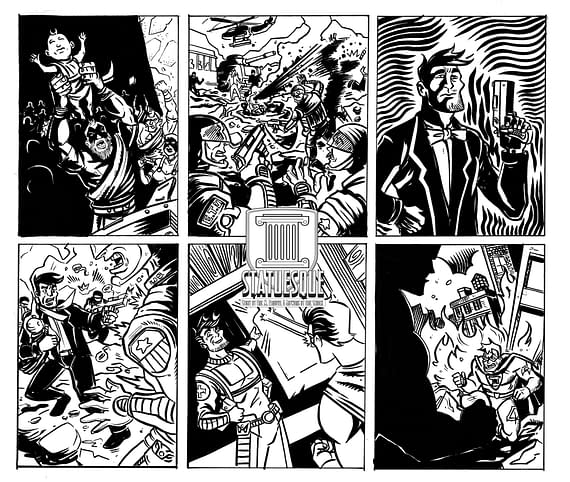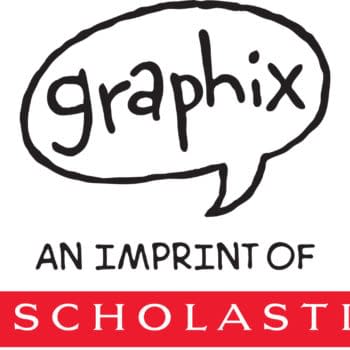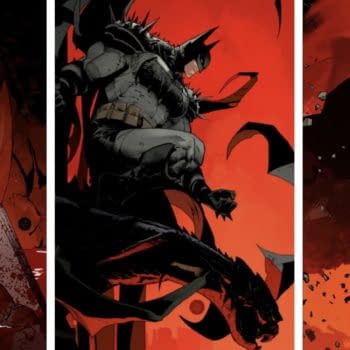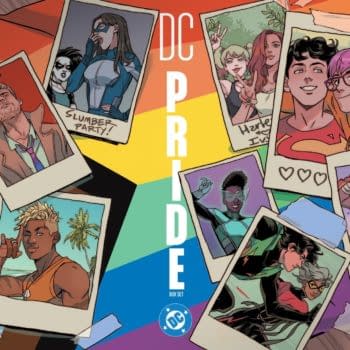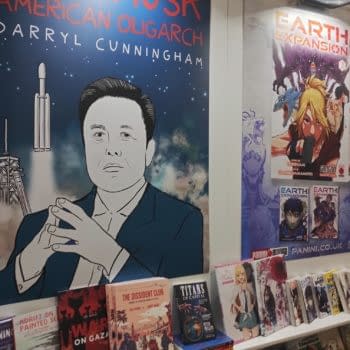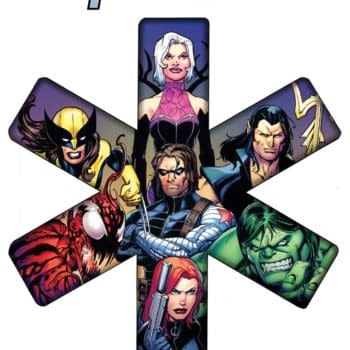Posted in: Recent Updates | Tagged:
Post-Modern Mythologies by Eric M Esquivel #8 – Colour Me Curious
Eric M Esquivel writes for Bleeding Cool.
I'm sitting on a secondhand suitcase right now, stuffing a Red Ranger lunchbox full of faux meats & nine dollar hemp bread that's probably going to expire by the time I've finished writing this.
I love working conventions. I really do. But, as a writer, they can be a little frustrating (and not because of that God damn hippie bread, either).
With the popularity of "geek culture" on the rise (I personally blame J.J. Abrams, the recent Miley-Cyrus-as-Supergirl rumors and the confrontational fuckability of Felicia Day), we get a lot of straight stragglers wandering into our conventions these days, armed to the braces with inane questions like "So…you make the little balloons what goes in the squares?".
I'm ninety eight percent sure that my own mother thinks I'm a letterer.
And, while I'm loathe to blame the media for the rise in violent crime, teenage homosinuality, and all the rest, I do blame them for that, because the American Media sustains itself by creating "stars" out of one piece of a creative puzzle.
There is nowhere where that is more evident than in film: movies are created by hundreds of people, from set designers, to costumers, to sound technicians, to casting directors, to The director of photography, to the editors, to the director—we can go on for pages and pages—but the only people the media pay any attention to are the actors, because they're the last link in the proverbial chain. Their work is the least subtle, and thus, the easiest to launch a marketing campaign around (despite the fact that they have pretty close to the least amount of control over how a picture comes out).
And of course that all trickles down to comics, who (being the insecure stepchild medium that they are) emulate their big sister Cinema like it's going to bring them her numbers, and thereby make us comic writer folk into even sadder individuals than screenwriters ('cause even though screenwriters rarely acquire the respect of the common man, at least they're paid like coke dealing kings for their efforts).
It's not so bad, though. At least there's a logic to it. After a couple of minutes explaining "um…y'know how comics are stories? I thought up the story", most people seem to get it (or at least pretend to).
And there has been a sort of writer backlash in the industry these last few years, so that's kind of cool. If the nineties were an era defined by illustrators, then the double oughts were defined by writers (and you can check the woefully lackluster sales to prove it).
If nothing else: at least I'm not a colorist.
The only process folks seem to be biologically incapable of understanding is coloring. I don't know why there's that cognitive dissonance (perhaps it's the simple title of the job? Maybe if we called colorists "pigmentation engineers" or something people would be more apt to take it seriously), but as is: apathy & confusion rule the day.
Color artists are tasked with one of the most vital duties in the production process, a contributing artform which can either make or break the work, but the common misconception people have is that coloring is easy and that all it takes is a box of crayolas and the ability to "stay within the lines".
Great coloring is seamless. It's crafted with the intent to subtly affect the subconscious mind (affecting mood, evoking cultural connotations, enhancing the clarity of forms), and maybe that's the reason it's not as celebrated as it should be: if coloring draws attention to itself, then it's bad coloring.
Not to be the 8,000th guy to say this, but…Ultimates 3, anybody? When Venom and The Black Panther had their tête à tete I double checked my copy to make sure I hadn't accidentally spilled an entire vial of India Ink on it. The delineation of forms was so unclear as to be jarring, and it completely interrupted the narrative flow of that book . For the split second that my mind couldn't process the information on the page, I was reminded that I was looking at pictures on a page, and not a silent spectator in a fully functional, fully believable world. It broke the spell, as it were.
Whenever anybody on the public relations side of funnybooks spits game at the media, one of the first phrases to come out of their mouths is invariably "collaborative medium" (it's required by law, or something), but apparently that has just become shorthand for "no, we don't let Evan Van Sciver come up with the story for Green Lantern. He can draw Kilowog six ways from Sunday, but have you ever really sat down and read Cyberfrog?" and has nothing to do with the fact that every single issue of every single comic book in the top ten list is the product of a writer, a penciler, an inker, a handful of editors, and a colorist–oftentimes two, if a flatter is involved (and, in the case of Barack The Barbarian, a crack team of high paid lawyers and Cimmerian voodoo priestesses were on the payroll, too). Do me a favor and go back through your stack of Wizards, and try your damndest to find a single mention of a colorist anywhere between the covers.
Not a one, huh?
It's easy to get frustrated with multibillion dollar corporations like Disney and Viacom when they spend millions of dollars advertising their products as near-singular visions, trading marketability for truth, but it 's also to be expected: comic books are an intrinsically American art form, and what is more American than denying the efforts of the many in favor of exalting an illusion of the supremacy of the few?
But at least there's solidarity among the community, right? Honor among unlovables, and all that? At least the guys who are fighting it out in the trenches day in and day out have each others' backs, right Erik Larsen (Image Co-founder & beloved writer/illustrator of Savage Dragon)?
"I don't know of a colorist that moves the needle–so I don't think they should get royalties"
Well, that's a bummer. But surely, he's just one particularly cynical naysayer in an industry of full of appreciate well wishers and sympathizers, right?
Let's check in with Chris Summers (renowned colorist for books as Superman, Nightwing, GI JOE, Dungeons and Dragons and The Perhapnauts) via email and see if he can lift our spirits a little bit:
"A few weeks ago I was at C2E2 and I was speaking with a well known author, who had some of his novels being adapted to comics. When he asked me what I did I told him I was a colorist, he looked at me and said "I am surprised you have a job anymore since everything is being colored by computers now." Now he was dead serious, he had no idea that there was a person that did the coloring, he believed that Computers colored comics now. Now this is an Author that has had several of his novels already adapted to comics and he truly believed this. This isn't the first time this had happened to me…"
Alright. It goes without saying that the situation described sucks. But, I get it. He's a prose guy. It's totally understandable that he wouldn't be privy to the ins and outs of the sequential comic graphic art novel album collection book medium.
"More recently I was working on book, the line art was coming in slowly and it was making everything run behind, again this was a licensed property, so the deadline was set in stone. Some of the other members of the creative team missed their deadlines, so instead of having two weeks to color the book I had about five days.
Now I am not the fastest colorist in town, so I had to work over Thanksgiving, missing the time with my family, in order to get the book in on time.
The next issue of the same book there was a mess up on scheduling, this book was being made into a motion comic as well as a traditional comic, so the deadline given to us for the comic was almost two weeks earlier than the motion comics guys'. Because of this I found out on Dec 22nd that the book had to be completed by the 26th and I had only received the majority of the line art a few days before that. After working through Thanksgiving I had already told the publisher I wouldn't work through Christmas and had been promised that wouldn't happen, yet–here we were again.
Luckily I was able to get them to get me some help so I only had to do 1/2 the issue while another colorist did the other half".
And that…that I can't defend.
Colorists are artists. They aren't assembly line workers, they aren't underlings who exists to serve a penciler and they sure as shit aren't robots. They are unique & vital creators who imbue their work with an emotional impact and sense of realism that their b/w counterparts can't match.
I love black and white comics. The majority of my scripts have been rendered in nothing but ink and sweat, but the very best line art in the world still looks like line art.
Line art by Eric Schock
It takes the touch of an adept colorist to flip that switch in the reader's brain from "my that's a pretty picture of a dude hitting a dude" to "oh crap, that dude just hit that dude!".
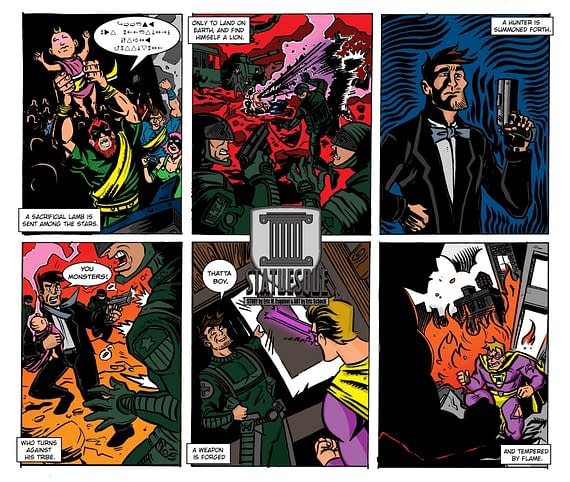
As a publisher, I know how hard it is to maintain morale. Comic books are a largely thankless job carried out by terrifyingly dedicated individuals whose only reason to live is the slim chance that maybe someday they'll be recognized for their efforts by their peers and childhood idols. When someone as respected and admired as Erik Larsen (a man well known for being the champion of the independent set) flat out says "nobody will ever give two shits" about someone's career choice it has a ripple effect on the industry that can't be calculated.
When I was seventeen I lived in a cultish Al-Anon commune for a handful of months, and my second most vivid memory of my time there (right after walking in on one of my female housemates sitting in the bathtub, topless, chugging an antiseptic-green bottle of Listerine and crying about the results of a Nascar race) is of making dinner with everyone the first night I moved in. I was lamenting about not being blessed with any culinary skill and only being able to assist with the boiling of the noodles when the Manson-esque patriarch of the collective smiled at me, placed his patchouli scented hand upon my shoulder and reassured me "it'd be pretty shitty spaghetti without noodles, youngblood".
I think we could all learn a little something from my former drug addicted, minor endangering, false messiah of a landlord and bear in mind that comic books, just like cruddy Italian cuisine, are the product of many peoples' efforts—and we can't all be responsible for the sauce.
Eric M. Esquivel is the author of the critically acclaimed graphic novel "Horrible Little People", the critically tolerated "Adventures of Bikini Automatic", and the critically despised "Childish Delusions of Grandeur and Superiority". He also wrote a whole bunch of mini comics that the critics know nothing about , and can be found at www.ModernMythologyPress.com .
His upcoming works include "Calabrese!" for Spookshow Records, "Pop! Science" for Modern Mythology Press, and "Statuesque" (see the teaser image in this very article) for whomever will give him money for it.
Eric also writes reviews of crappy bronze age comic books for Bookmans Entertainment Exchange. You'd dig 'em.
He once did boring journalism stuff for The Tucson Citizen & Heroes And Villains Online, but that was before Rich Johnston offered to pay him for copying and pasting Erik Larsen tweets.
He is not John Siuntres' son*
*or is he?†
† He isn't.


